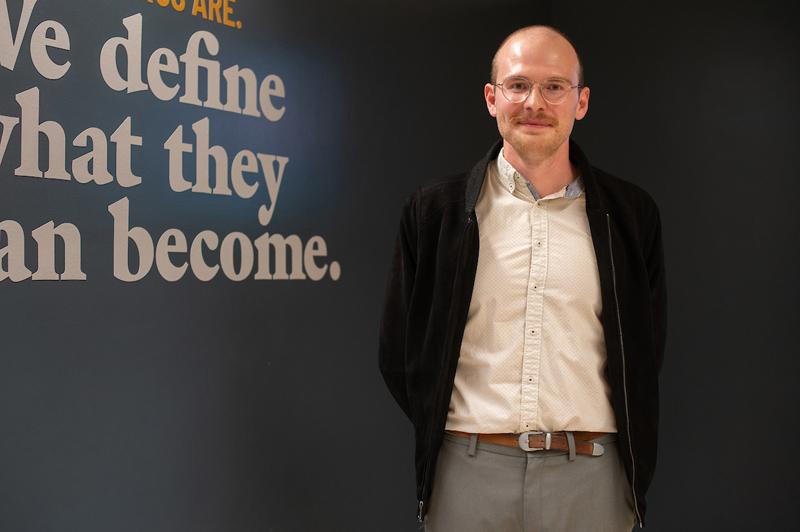
With our Sociology master's degree, you can acquire research and analytical skills to address today's most pressing issues, including criminology, gender studies, and inequality.
You can take advantage of competitive funding and get experience teaching sociology and finish in as little as 12 months. Our students not only have the opportunity to learn to teach but they also have opportunities to apprentice and collaborate with faculty on research projects.
Take Advantage of a Sociology Teaching Internship
Master’s students have the opportunity to complete a seminar on the sociology of teaching. As a part of the requirements for this course, students complete a teaching e-portfolio and design and deliver several lectures to undergraduate classes and to their peers in the graduate program. Graduate students can compete for limited graduate teaching positions in our department. Those selected teach their own sections of Introduction to Sociology (under the supervision of the graduate director) during their second year in the program.
Sociology M.A. Courses & Degree Requirements
View Degree Requirements in the Official Academic Catalog
The 30 credit Sociology M.A. degree curriculum offers a range of courses in theory, methods and substantive topics.
Required core courses include SOC 6160 Sociological Theory, SOC 6540 Social Research Methods, and a research methods course selected from several options.
Students also take graduate seminars, additional sociology courses, plus additional hours in specialized readings, research problems, practicum, independent study, or thesis.
Culminating Experience
To demonstrate competence at the master’s level in sociological theory and research methods and to show proficiency in their chosen areas of concentration, students can complete a thesis, comprehensive exam, or applied/policy project.
- Thesis:Independent research on a topic selected by the student that integrates knowledge and skills to contribute to the research literature in the field.
- Comprehensive Exams:The written exams are in two general areas of sociology related to the student’s specific interests and result in a demonstration of depth and breadth of knowledge.
- Applied/Policy Project:Through the systematic evaluation of a social issue, the student proposes and presents pragmatic recommendations to shape meaningful social/public policy. The final product may take the form of a policy analysis paper or a manuscript-length grant proposal. Candidates following the applied/policy path complete a semester long practicum experience arranged in collaboration between the practicum coordinator, practicum site host, and MA candidate.
Research Opportunities for Sociology Graduate Students
Our students not only have the opportunity to learn to teach but they also have opportunities to apprentice and collaborate with faculty on research projects. Master’s students are often recruited and trained by faculty researchers to assist and partner on data collection and analysis, and in the co-authoring of presentations and publications.
The Sociology faculty are active scholars, and students have the opportunity to apprentice with faculty in several ways.
Students on assistantships are assigned to help faculty with their research for 6 to 20 hours per week. Faculty often have ongoing research projects (both funded and unfunded) that students work on and use for their thesis data. Recently students have worked on such projects as: college underage drinking project, rural prostitution, prison culture, violence against women, and the rural welfare reform project.

About the Master's Degree in Sociology
The Master of Arts in Sociology at Ohio University seeks to train students for advanced graduate training or employment in a variety of applied settings. The department maintains a strong emphasis in the theories and methods of the discipline while maintaining strengths in the areas of criminology/deviance, gender studies, and inequality.
A variety of opportunities exist for students to obtain training and experience both inside and outside the classroom. Sociology faculty members are actively engaged in research and publication, provide leadership in regional and national professional associations, and have received numerous awards for teaching excellence. Students are encouraged to apprentice with faculty members on research projects, teaching internships, and related professional experiences. Students also may choose to work at various institutes and centers in the university or to participate in an interdisciplinary program such as international and area studies, women's studies, and environmental studies.
Ohio University's graduate program in Sociology is designed to offer flexibility that permits students to maximize their unique interests and capabilities. The low student-to-faculty ratio promotes individualized attention and contributes to the high completion rate of students in the program.
Time to Degree:Many students are able to complete the program in two semesters plus a summer. Others may take longer, as provision must be made for the master's thesis, comprehensive examinations, or applied/policy project. The academic year at Ohio University is composed of two 15-week semesters; students usually complete their programs in three to five semesters (between one and one and a half calendar years), depending on program and options selected.


